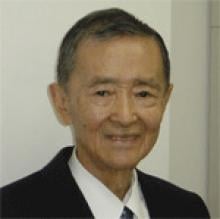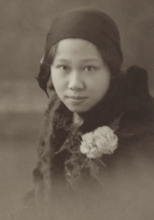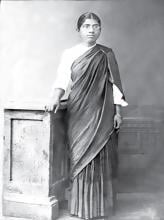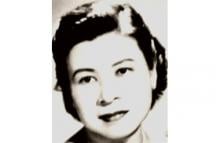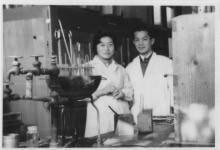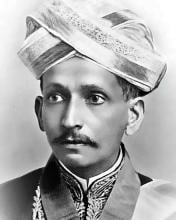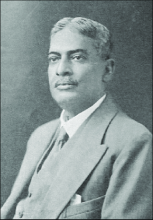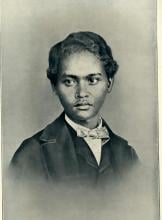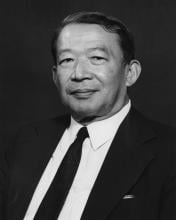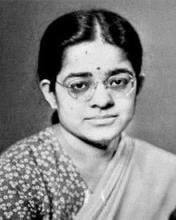People
News
14 Jan 2008
The last of a series of seven surveys of residents’ opinions towards Hong Kong Disneyland conducted by the School of Hotel and Tourism Management (SHTM) of The Hong Kong Polytechnic University (PolyU) found that residents’ opinions towards the Disney theme park were still mixed, shifting more to the negative.

11 Jan 2008
Local governments should start taking action now and begin implementing climate change adaptation and mitigation policies to cushion the impact of climate change, Dr. Rajendra Pachauri, Chair of the UN Intergovernmental Panel on Climate Change (IPCC) said during a video-conference held on November 2, 2007 at the Asian Institute of Technology (AIT).
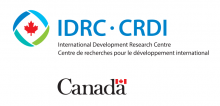
02 Jan 2008
ICTs are powerful tools for reducing poverty, for combating HIV/AIDS, and for promoting good governance. At the Third Global Knowledge Forum (GK3) held recently in Kuala Lumpur, Canada’s International Development Research Centre (IDRC) and its research partners showcased some of the innovative ways in which ICTs can foster human development.
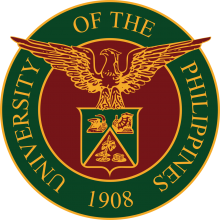
11 Dec 2007
The Office of the Vice Chancellor for Research and Development, University of the Philippines Diliman is now accepting papers for publication in the Social Science Diliman journal.

11 Dec 2007
The Office of the Vice Chancellor for Research and Development, University of the Philippines Diliman is now accepting papers for publication in the Humanities Diliman journal.

10 Dec 2007
Ottawa, Canada, December 10, 2007 – Recognizing the serious consequences of climate change for development, the International Development Research Centre (IDRC) is helping developing countries adapt by supporting research and strengthening local institutions so they can better prepare for an uncertain future.

06 Dec 2007
Richard Fuchs believes that people who want to understand how the world is changing should look to the wave of transformation that is sweeping across Asia.

06 Dec 2007
The International Development Research Centre (IDRC) and the Canada Research Chairs Program are launching an initiative to pair leading researchers from universities in Canada with those in developing countries to collaborate on issues of mutual concern.

04 Dec 2007
The work of rice researchers has received major encouragement as 2007 comes to a close, with staff at the International Rice Research Institute (IRRI) and their colleagues receiving widespread recognition and several major awards.

02 Dec 2007
This is the first of a series of nine papers exploring the state of the science and practice of compensation and rewards for environmental services in the developing world.

22 Nov 2007
TWAS, the academy of sciences for the developing world, is seeking nominations for the 2008 Trieste Science Prize scheme, aimed at honouring scientists living and working in developing countries. The closing date for nominations is 31 January 2008.

15 Nov 2007
Though the President is attempting to brave the storm, his position is much weakened as he takes hurried measures to redress the prevailing situation. He has refused to give a date for lifting the state of emergency and said it might continue even beyond the elections because of the situation on the terrorism front.

15 Nov 2007
TWAS has announced the winners of the TWAS Prizes for 2007. Each winner will receive a US$10,000 cheque and be invited to lecture about his or her research at the Academy’s Silver Jubilee anniversary celebration scheduled to take place in Mexico City from 11 to 13 November 2008.

15 Nov 2007
TWAS awarded its first-ever Regional Prizes for Public Understanding of Science. Each prize carries a US$3,000 cash award. It is given to individuals who have made outstanding contributions to improving public understanding and appreciation of science.

15 Nov 2007
TWAS, the Academy of Sciences for the Developing World, has announced the election of 45 new members. The election took place at the Academy’s 18th General Meeting, held in Trieste, Italy on 13 November.

14 Nov 2007
The political impact of climate change in Australia and the United States is the focus of a collection of News Features in Nature this week.

14 Nov 2007
As states encroach on Internet governance around the world, IDRC is supporting a major new initiative that will investigate the impacts of Internet censorship in Asia.

14 Nov 2007
IDRC was one of the earliest development agencies to embrace information and communication technologies (ICTs) as powerful tools for reducing poverty, for combating HIV/AIDS, and for fostering good governance.

08 Nov 2007
The University of the Philippines Asian Center in collaboration with The UP Vargas Museum, The Japan Foundation, National Commission for Culture and the Arts, and Filipino-Japanese Foundation of Northern Luzon, Inc. cordially invites you to the Philippine nikkeijin 2007

30 Oct 2007
Most developing countries will not reach the MDG target on hunger and poverty, let alone those focusing on education, health, and human rights. According to World Bank projections, by 2015 700 million people worldwide will remain poor — many of them extremely poor — and 600 million will go hungry.

30 Oct 2007
The article analyzes two cases of domestic violence involving Filipino women in Australia, Rosalina Canonizado and Annabel Strzelecki. Interviews of their close relations and newspaper representations reveal sexual and racial "othering" of the women in the discourse of "mail-order bride."

30 Oct 2007
The study examines the content of websites featuring prospective brides from the Philippines and Thailand. It explains how and why the representation of Thai and Filipino women on intermarriage websites involves power and violence thus creating unequal Third World-First World power relations that are embedded in international migration circuits.

28 Oct 2007
Yongxuan from Guangzhou in southern China told the meeting that pollution-control regulations appeared to be doing little to clean up her country’s severely degraded rivers, while Gerald from Accra pointed out that much of the Ghanaian capital’s wastewater is dumped directly into the ocean.

28 Oct 2007
IDRC congratulates the The Intergovernmental Panel on Climate Change (IPCC) on being awarded the 2007 Nobel Peace Prize, and is proud to be associated with some of its contributors.

28 Oct 2007
For some journalists, being under the gun has nothing to do with a deadline. Join us for a roundtable discussion with journalists from the developing world who have been up against apartheid, tyranny, censorship, corruption, and other enemies of democracy.

28 Oct 2007
When corrupt business alliances collectively wield more economic clout than some sovereign states, what can be done?

28 Oct 2007
Hunger can be eradicated “in my lifetime,” says the man known as the father of the Green Revolution in India. M.S. Swaminathan speaks about his values, his achievements, and his ambitions.

23 Oct 2007
Are natural resources a curse? Calls for research on global epidemics to be performed where they hit hardest and an Islamic ethical framework for research into and prevention of genetic diseases.

21 Oct 2007
Keio University will be the first Japanese university to host the “Keio Challenger International Tennis Tournament 2007”, an international men’s tennis tournament, to commemorate its upcoming 150th anniversary in 2008. The tournament will be a Challenger Series event* officially recognized by the Association of Tennis Professionals (ATP).

18 Oct 2007
The University of the Philippines, Diliman in collaboration with the National University of Singapore, invites abstracts for the 8th ASEAN Inter-University Seminars on Social Development on May 28 to 31, 2008, Manila, Philippines. The theme for this event is "ASEAN as a Community: Solidarity in a Globalizing World."
Researchers
Sorry, no researchers coming up for this topic.
- « first
- ‹ previous
- 1
- 2
- 3
Giants in history
Michiaki Takahashi (17 February 1928 – 16 December 2013) was a Japanese virologist who developed the first chickenpox vaccine.
Maggie Lim (5 January 1913 – November 1995) was a Singaporean physician who promoted family planning and expanded the access to clinics to improve the quality of life for mothers and children in Singapore’s early days.
The founder of the Adyar Cancer Institute in India, Muthulakshmi Reddy (30 July 1886 – 22 July 1968), fought to uplift women and girls from impoverished situations.
Through her iconic stories featuring fictional scenes from the history of the Philippines, language teacher and academic Genoveva Matute (3 January 1915 – 21 March 2009) helped strengthen the Filipino identity.
Tsuneko (7 June 1933) and Reiji Okazaki (8 October 1930 – 1 August 1975) were a Japanese couple who discovered Okazaki fragments – short sequences of DNA that are synthesized during DNA replication and linked together to form a continuous strand.
Sir Mokshagundam Srinivasa Shastry Vishveshwarayya (15 September 1860 – 14 April 1962) is widely regarded as India’s most outstanding engineer. In a career that spanned almost his entire life, Vishveshwarayya played a pivotal role in several engineering projects, including designing the Krishnarajasagara dam that is still the source of irrigation and drinking water for parts of Karnataka today.
Indian scientist and physician Upendranath Brahmachari (19 December 1873–6 February 1946) is best known for creating a drug called Urea Stibamine, used to safely and reliably treat visceral leishmaniasis (or Kala-azar), a severe infection caused by the Leishmania parasite.
Little is known about Ali, a teenager from Sarawak, Malaysia, who was chief assistant to the famous naturalist Alfred Wallace. Most of what is known comes from Wallace’s writings. Ali accompanied Wallace on expeditions throughout the Malay Archipelago from December 1855 to February 1862.
U Hla Myint (1920 – 2017) was a celebrated economist from Myanmar. Considered a prodigy, he was admitted to Rangoon University to study economics when he was just 14 years old. He went on to earn a Ph.D. at the London School of Economics (LSE).
Rajeshwari Chatterjee (24 January 1922 – 3 September 2010) was the first female engineer from Karnataka in India.


